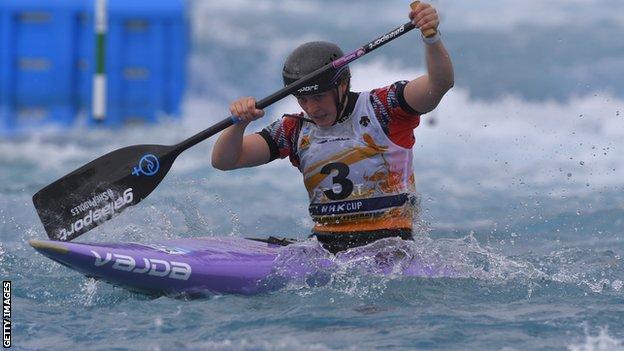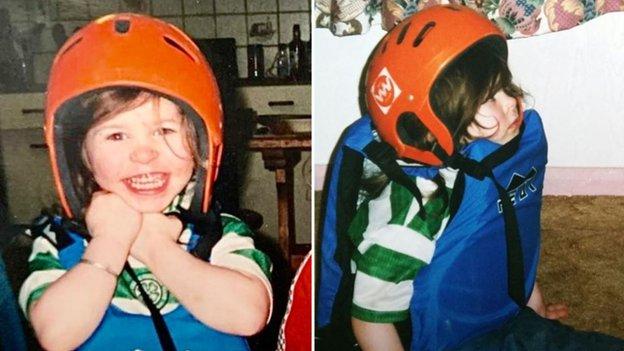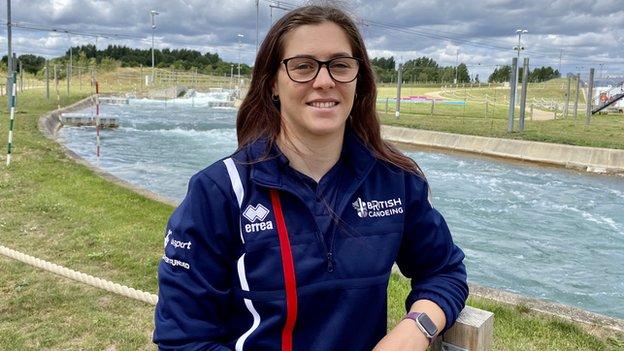
Victories, defeats and extreme emotions are all part of an elite athlete’s career, but few who line up at next year’s Olympics will have endured – or overcome – experiences quite like Kimberley Woods’.
To many, the European medal-winning slalom paddler has been on an upward trajectory for over a decade, with that journey culminating in selection for Tokyo 2020 late last year.
The reality away from the water is a dramatically different story.
She cites therapy at the Priory clinic, in addition to an intervention by her coach, as being crucial to saving not only her career, but her life.
“Looking back you can probably track it to my childhood and being bullied, which led to low self-esteem and down the road depression and self-harming,” the 24-year-old tells BBC Sport.
“It was a cycle, where I had paddling as my escape so when it was going well everything was fine, but if I had an injury and was left alone 24/7 then all of the emotions I’d bottled up would come out and it’d leave me very vulnerable.”
Table Of Contents
‘I was pushed around for being a tom-boy’
Woods is likeable, chatty and approachable, but she says she was not always so open and found it difficult to make friends at school, where she was often verbally abused.
Salvation came through sport – initially rugby, netball, football, basketball and cricket – but that too created opportunities for bullies to target her.
“I was muscular because of sport and people would say horrible things because I had a six-pack and big shoulders,” she recalls.
“Things are changing but as a girl who was a bit of a ‘tom boy’ back then I had to deal with being pushed around and I spent most of the bus journey home in tears.”
Born in Rugby in Warwickshire, she grew up with three younger siblings and was taught to “be strong” and stand up for herself.
That meant Woods would never back down when challenged by other students and eventually those altercations led to her being excluded from school.
“At one point I wasn’t allowed to be at school half of the time because of my behaviour and then about a year out from my GCSEs I realised I needed to settle down,” she says.
‘I felt I was just keeping going for canoeing’

Woods decided to pursue canoeing after watching a video of her aunt, Diane Woods, who won silver at the 1994 World Junior Championships.
“I was so inspired,” she recalls. “I then won my first race and although it was basically because there was no-one else in it I didn’t care because I got a trophy and I just loved it.”
Canoeing gave Woods an outlet to channel her “anger and adrenaline” and junior honours were translated to senior success in 2015 when she won her maiden European title and helped the British women to a world team silver.
“On the face of it I was doing really well, but away from canoeing I wasn’t,” she says.
“I was never particularly close to my family so I’d cling to relationships when I found something good, but 2015 was the first time I had quite a bit of time on my own.
“Then I needed an operation on my knee so I couldn’t paddle and being on the sofa on my own all day was the worst place for me, which is when the self-harming began.”
Self-harming was a ‘cry for help’
Woods admits she was in a “depressive state”, her mood fluctuating dramatically, and she would often struggle to find the motivation to get out of bed.
The paddler hid scars on her arms with long-sleeved T-shirts and although after returning to sport she would go for periods where she did not self-harm, relapses occurred when challenges emerged.
“I just never had the courage to say I have a problem, help me,” says Woods, who adds that an intervention by her coach Craig Morris was a “massive” turning point in her life.
“If he hadn’t sat me down and helped me open up I don’t know where I’d be – certainly not heading to the Olympics next year!”
“We were very worried,” says Morris, who has worked with Woods for nearly a decade.

“It was not nice to see her struggle, but it was important to listen and try to understand what she was going through.
“Once she was comfortable we helped her make informed choices about the action she could take and I’m immensely proud of what she’s achieved – not just on the water.”
Woods ‘proud’ of her recovery
Between them, and with help from other members of the British Canoeing support team, Woods was referred to the Priory clinic in London for treatment.
Although it did not produce instant results, Woods eventually began to understand why she was struggling and developed techniques to improve her mental health.
“I grew up being told ‘the Woods family is so strong’ and that I can’t show any weakness, but I learnt that sharing and talking through problems is so important,” she says.
“They also gave me skills, so whenever I was close to self-harming I’d always have a hair band on my wrist and just flick it, to have a distraction almost.”
Woods received weekly therapy from early 2016 until the summer of 2018 and has not experienced any relapses in the time since.
That is something she says she feels proud of, particularly given the challenges lockdown and a 12-month delay to the Tokyo 2020 Olympics have presented.
“I’d learnt the importance of keeping my mind occupied and my coaches were great with creating sessions for me at home as well as having regular online meetings,” says Woods.
“It’s difficult as we’d have found out this month whether I’d have achieved my Olympic goals, but I’ve come a long way and I know that with another year I’ll be even stronger.”
‘Struggling? Please speak out!’
Woods says she was inspired to speak about her own struggles after reading the stories other athletes during the mental health awareness week in May.
“Being open and honest is the best thing you can do,” she says. “Escaping through sport isn’t sustainable and, for me, until I addressed that it was just masking the emotions I was experiencing.
“Traditionally there’s been a bit of a taboo around mental health, but things are changing and talking your problems through can really change your life for the better.
“I never thought that I’d get out of it so positively but I have, and one of the biggest things I’d say is to find the love in yourself and don’t try to seek it in others.”
If you’ve been affected by self-harm or emotional distress, help and support is available via the BBC Action Lineor you can visit:
Mental health is one of many issues raised by the BBC Elite British Sportswomen’s Survey. BBC Sport has been shining a spotlight on the others with coverage throughout this past week on the BBC Sport website, BBC Radio 5 Live and BBC TV. More information can be found here.